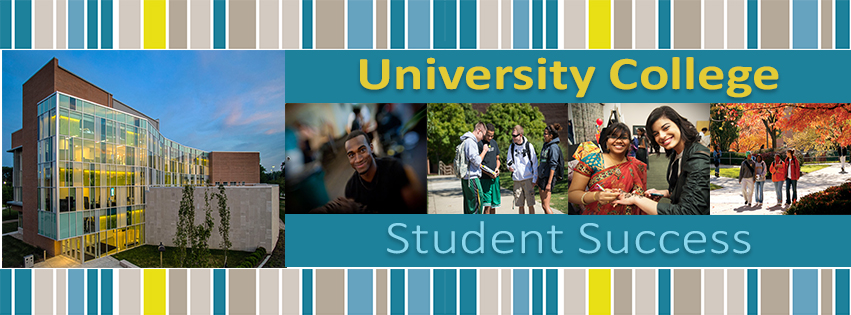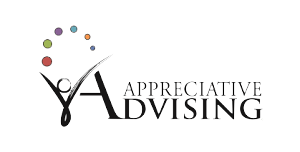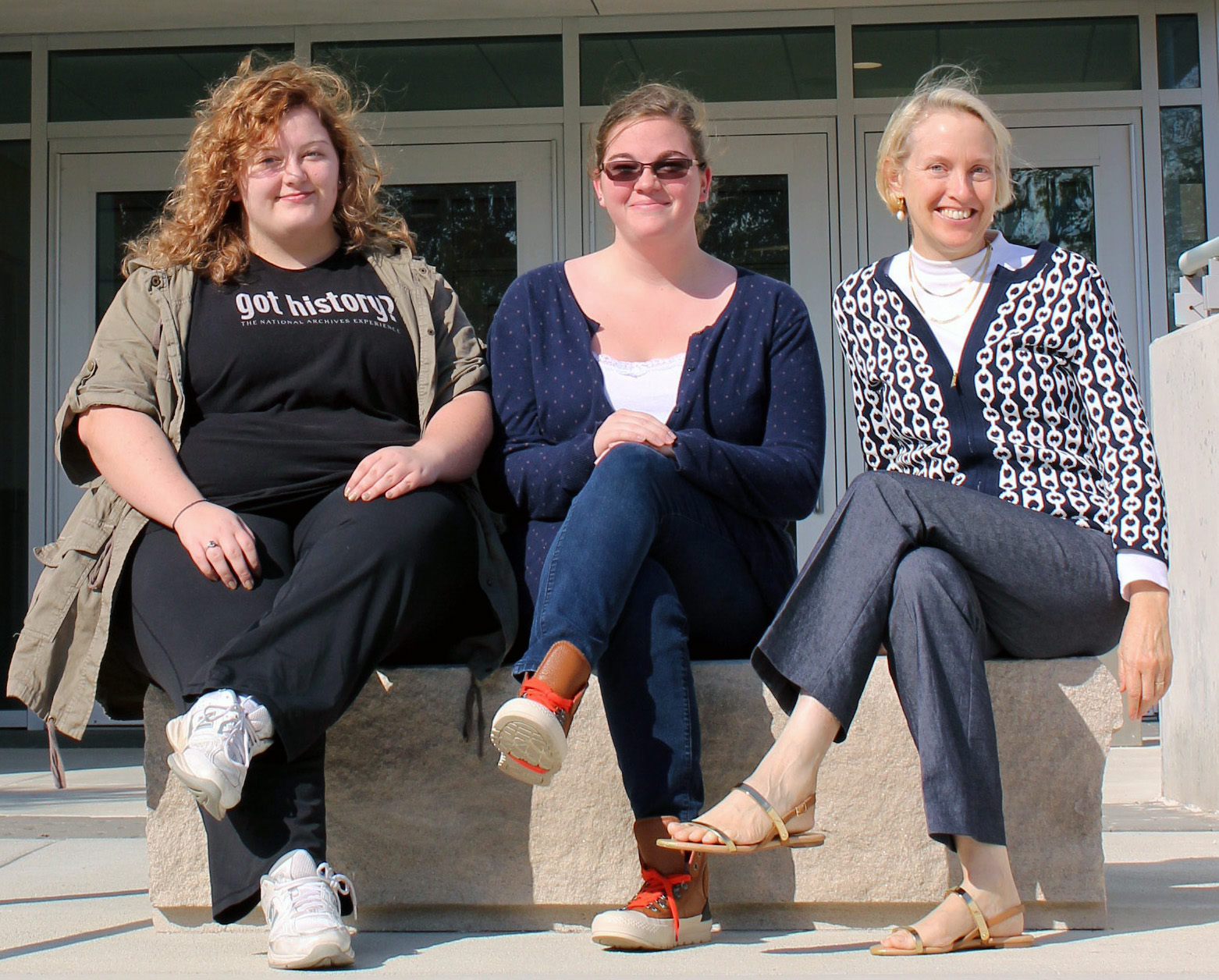University College Fall 2016 Newsletter

Fall 2016 - Table of Contents
From Dr. Sudkamp
Co-requisite Courses
Appreciative Advising Certification
Alpha Lambda Delta Conference
Guide: The Student Success App
From Dr. Sudkamp
 The Student Success Center building has been awarded Leadership in Energy and Environmental Design (LEED) Silver status. Projects pursuing LEED certification earn points across several areas that address sustainability issues including materials and resources, indoor environmental quality, water efficiency, energy and atmosphere, and innovation in design. Look for the LEED certification plaque on display at the ground floor entrance to the building in the near future.
The Student Success Center building has been awarded Leadership in Energy and Environmental Design (LEED) Silver status. Projects pursuing LEED certification earn points across several areas that address sustainability issues including materials and resources, indoor environmental quality, water efficiency, energy and atmosphere, and innovation in design. Look for the LEED certification plaque on display at the ground floor entrance to the building in the near future.
Additional acknowledgement of the Student Success Center building was given to Annette Miller Architects who received a national award for Outstanding Design, Common Areas from American School and University, an organization focused on educational facilities. They also received the Merit Design Award from AIA (American Institute of Architects), Dayton Chapter.
Most importantly, the Student Success Center is about what goes on IN the building and serves as the hub of student success initiatives and programming. The key components of the student success strategy are high-impact programs and services supported by state of the art technology and research. The full University College and Student Success Completion Roadmap is available online. Two of the initiatives, the Math Developmental Education Co-requisite model and Proactive Intrusive Advising, are highlighted in this semester’s newsletter.
We are also excited to announce the launch of Guide, the mobile student success app from EAB. Incorporated with the comprehensive Student Success Collaborative Campus (SSC), Guide includes features to help students thrive in college like major explorer, journeys, hold center, class schedule, academic calendar, and resources.
Currently being piloted by first-year students, access to Guide will be expanded to sophomores in Spring 2017 and new features will continue to be added, including online appointment scheduling for advising and the Academic Success Centers. For more information about Guide, please visit the University College website.
We take great pride in our student peer leaders who work in several different job categories in University College. They balance providing support to our university with successfully managing an academic schedule. University College employs 296 students in 335 roles across our Academic Success Centers, First-Year Programs, Foundation Studies, and Academic Advising where 3 in 5 maintain a GPA of 3.5 or higher.
Finally, we are happy to welcome several new academic advisors to our staff – Erin Dunn-Vogler, Jessica Kelbley, Keith Douglas, and Joyce Winters.
Co-requisite Courses
Foundation Studies in University College continues to work toward full implementation of co-requisite courses in math and English in collaboration with the Math Department and English Department. Wright State’s student success plan envisions reducing time to graduation and increasing core course completion and overall student retention by providing co-requisite remediation. Co-requisite remediation is a strategy developed, in part, by Complete College America.
Complete College America lays out a blueprint containing six pillars. It calls for purposeful placement of students in courses based on their academic and career goals as well as their overall college readiness. All students are considered college students, so they are enrolled in credit-bearing gateway courses and provided with academic support as a co-requisite rather than a prerequisite. The goal is for students to complete all of their gateway courses in on academic year. To support that goal, multiple pathways are developed into programs of study with co-requisite support as the bridge into programs of study. Ideally, this approach helps students get into their chosen pathways sooner, shortens time to graduation, and reduces the cost of their education.
Wright State has already successfully piloted co-requisite remediation in its English Composition program through its implementation of the Accelerated Learning Program (ALP). In ALP, students who would otherwise have taken a developmental composition course prior to taking ENG 1100 now enroll in the core course and co-enroll in a developmental support course. The pilot showed increase pass rates in developmental coursework by 13%. Starting Fall 2016, all developmental writing courses co-enroll in ENG 1100.
A similar program is being developed for math that will pilot in the Spring a new Quantitative Reasoning (QR) course to support the new QR pathway that is being designed. Pathways for Statistics and College Algebra are also being designed. Collectively, these pathways will enable students in the arts, social sciences, and physical sciences meet the math learning outcomes most appropriate for their chosen fields of study.
To facilitate the development of the co-requisite plan, a team of Wright State faculty and staff attended Complete College America’s Co-requisite Academy on October 20 and 21. The team met with experts from across the country who have successfully implemented the strategy and worked to develop a project plan for implantation. The team included:
- David Bringhurst, Assistant Dean for Academic Success & Foundation Studies
- Tim Littell, Associate Dean, University College and Executive Director for Student Success
- Carol Loranger, English Department Chair
- Ayse Sahin, Math Department Chair
- Jerry Nelms, Academic Director, Developmental Writing
- Peggy Kelly, Academic Director, Developmental Math
- Ann Farrell, Math Faculty
The goal is for all remediation in math and English to occur as a co-requisite by the end of the 2017-18 academic year.
Appreciative Advising Certification
 One of the key strategies for improving student success and retention is for academic advisors to actively engage students in the learning process by creating an environment that positively encourages students to take ownership of their academic career by acknowledging and utilizing their strengths and skills and by creating action steps to achieve their long term academic goals. We assert that a successful implementation of any academic advising strategy must include trust and rapport with students as the centerpiece. We believe that learning and implementing Appreciative Advising in the Academic Advising unit will provide the necessary framework for continuous improvement in the service provided to students and to overall student success.
One of the key strategies for improving student success and retention is for academic advisors to actively engage students in the learning process by creating an environment that positively encourages students to take ownership of their academic career by acknowledging and utilizing their strengths and skills and by creating action steps to achieve their long term academic goals. We assert that a successful implementation of any academic advising strategy must include trust and rapport with students as the centerpiece. We believe that learning and implementing Appreciative Advising in the Academic Advising unit will provide the necessary framework for continuous improvement in the service provided to students and to overall student success.
“Appreciative Advising is a constructivist way of thinking that provides a theoretical infrastructure and practical framework for advisors to optimize their interaction with students and colleagues in individual and group settings.” (Bloom, Hutson & HE, 2008) Appreciative Advising’s six phase model provides a fluid nonlinear scaffold for advisors to “intentionally use positive, active, and attentive listening and questioning strategies to build trust and rapport with students (disarm); uncover students’ strengths and skills (discover); encourage and be inspired by students’ dreams (design); co-construct action plans with students to make their goals a reality (design); support students as they carry out their plans (deliver); and challenge both themselves and the students to do and become even better (don’t settle).” (Appreciative Advising Whitepaper, 2008).
Academic Advisors completed the Appreciative Advising online course via Florida Atlantic University during the fall semester. Advisors will utilize the six phase Appreciative Advising model as part of an overall proactive advising strategy that uses a student centered approach as the foundation to aid in retention & graduation efforts for University College and Wright State University. The hiring of several new advisors has permitted the application of proactive Appreciative Advising techniques within University College.
Having completed the Appreciative Advising online course, advisors will apply for a certification in Appreciative Advising. “Certified Appreciative Advisors demonstrate both a conceptual understanding of the Appreciative Advising framework and have demonstrated specific Appreciative Advising skills and techniques. Certified Appreciative Advisors are committed to a standard of excellence in the field of advising and optimizing their students’ educational experiences.” (Appreciative Advising Certification, Florida Atlantic University, 2016)
Alpha Lambda Delta Conference
Alpha Lambda Delta (ALD), the National Honor Society for First-Year Students, has existed on campus since 1987 and is administered through University College. Students must earn a 3.5 GPA or better during their first year to be eligible to join. 
Sometimes though, people assume it’s a sorority or fraternity. At the ALD leadership conference in Washington, DC October 28-30, Wright State’s chapter picked up an explanatory catchphrase you might soon see on T-shirts: Alpha Lambda Delta – Geeks, not Greeks.
ALD officers, Amanda Loving and Abby Hergenrather, secured funding from the Wright State University student organization budget board to attend the national ALD leadership conference along with chapter advisor Catherine Queener. All three returned with inspiration and exciting experiences to share.
Amanda Loving, president of Wright State’s chapter, is a senior Finance/Management major scheduled to graduate in Spring 2017. Amanda is passionate about training service dogs; ALD’s fundraising for the last few years has been toward 4 Paws for Ability. Conference workshops inspired her with ideas for a new “puppy paw print paintings” fundraiser and a Valentine’s Day event. Vice-president Abby Hergenrather is a junior Athletic Training major, on the pre-med track. She most enjoyed meeting other student leaders from colleges all over the US during the conference.
Both Amanda and Abby were inducted into ALD as first-year students and became active in ALD leadership as sophomores. Chapter advisor Catherine Queener notes that ALD is one of the few student organizations where a sophomore can be elected and serve in a leadership role. One of the ideas she is excited about is a “passing the torch” program where outgoing officers share a meal and ideas with new officers.
Conference organizers planned in a few hours of free time both afternoons, so the WSU trio toured the US Holocaust Memorial Museum and the Capitol Building. Queener: “I admit to a nerdy thrill at every sight of the capitol dome. It was exciting to be in our nation’s capitol right before the 2016 election.”
The last couple years have been big for ALD at Wright State. “Our chapter was recognized by the national organization for increasing membership over 200%, we applied for and received a grant to go to the leadership conference, and we painted our ALD crest in the student organization hallway,” Amanda noted. Hergenrather added, “We also raised money and made blankets for 4 Paws, and this was our third year in a row volunteering at Aullwood Audubon Center’s non-scary Halloween program for little kids.”
EAB Guide : The Student Success Mobile App
College Simplified Learn more about Guide
Learn more about Guide
Guide is the new free mobile app to help students thrive in college*. Guide is designed to help students stay on track and connect to campus resources. Piloted with first-year students, the goal is to introduce the app to all students next summer.
Features:
- Major Explorer: Answer questions about your interests to see recommended majors. Learn about related careers and how much they pay.
- Journeys: Step-by-step instructions and helpful tips for college success. Journeys help you: pay for college, succeed in classes, get involved on campus, and much more!
- Hold Center: Guide alerts you to any Holds placed on your student account. You can easily resolve Holds to keep on track.
- Class Schedule: View your current class schedule. Pull your class schedule into your smart phone calendar automatically.
- Academic Calendar: View important key dates like when to register. Pull academic calendar dates onto your smart phone calendar.
- Resources: Connect to resources directly from your phone. Call or email campus offices seamlessly.
Getting Started:
- Go to the Google Play or Apple App Store
- Search "Guide college simplified" to install app
- Once installed, search for "Wright State University"
- Use your Wright State credentials to log in
*Students without smartphones can use the desktop version at eabguide.com

